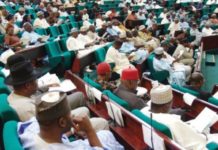
Promoting Accountability In Public Finance
President Muhammadu Buhari, on the 19th of June, 2019, made his first political appointment after being sworn in as the 16th President of the Federal Republic of Nigeria. It was the re-appointment of Mr. Ahmed Idris as the Accountant-General of the Federation (AGF). The notice of his appointment was released to Nigerians by the Head of the Civil Service to the Federation, Mrs Winifred Oyo-Ita.
A letter signed by the Secretary to the Government of the Federation, Mr. Boss Mustapha, conveying the approval of President Buhari, was quoted as saying that the re-appointment of Idris, was for the second and final tenure of four years as AGF.
Thus, that made the Kano-born Idris, the first individual, in recent past to be appointment as AGF for two consecutive tenures. He also became the 3rd in the history of Nigeria to serve in that office for two straight terms. That, you would agree is not a mean feat. It is a great plus for the Nigerian Civil Service. Needless to add that seasoned accountant Ahmed Idris, is the first and the only member of the Association of National Accountants of Nigeria (ANAN) to hold the post of AGF.
However, for most followers of the Nigeria’s Public Finance Management sector, Mr. Idris re-appointment as AGF may not have come as a surprise. From the very first day of his assumption of office on the 29th of June, 2015, the AGF left no one in doubt of his determination to re-calibrate and re-define the practice of Public Finance Management (PFM) in Nigeria. Indeed, he kept his word as he neither disappointed Mr. President nor his constituency, the Nigeria Civil Service.
Evidently, Mr. Idris’ performance in the past four years has undoubtedly transformed the landscape of the public finance management in the country. He has left indelible marks in the nation’s financial sector. Little wonder, Mr. President did not even wait for his first tenure to lapse, before renewing the four-year mandate.
As AGF, Ahmed Idris has always stood for fairness, justice and equity. In 2016, his quest for transparency and accountability drove him to work with the then Minister of Finance, Mrs. Kemi Adeosun, to ensure that a new revenue generating template was introduced to enable all Revenue Generating Agencies as well as the Office of the Accountant-General of the Federation, present their reports in a clear and unambiguous manner, which will be acceptable to members of the Federation Accounts Allocation Committee (FAAC).
That singular action was indeed revolutionary. As a matter of fact, it had ensured that revenue generations were shored-up, and the amount shared by the three tiers of Government has remained appreciable all through the tenure. In another vein, the AGF instituted a culture of a monthly publication of the balance amount in the Excess Crude Account (ECA) at the end of the monthly FAAC Meetings, thus leaving no one in doubt of the exact amount in the account.
Furthermore, some of the other bold and transformational reform initiatives carried out under his first tenure, which has received national and international acclaim include: the full implementation of the Treasury Single Account, the implementation of the IPSAS Accrual Basis of Financial Reporting, the implementation of the Zero based budgeting preparation using the GIFMIS platform and the completion of the GIFMIS pilot phase, the transformation of the Federal Treasury Academy in Orozo to a world-class financial training institute, the full implementation of the Integrated Personnel Payroll Information System (IPPIS), an unwavering commitment to staff welfare, and championed institutional reforms of the nation’s treasury, just to mention a few.
On the Treasury Single Account (TSA), it is popular knowledge that the TSA was part of the Public Finance Management (PFM) reforms embarked by Federal Government in 2006, under the Economic Growth Reform Programme, (EGRP). However, successive governments could only implement the electronic payment (e-payment) aspects of the reform, thus leaving the electronic collection (e-collection) aspect which indeed is the crux of the TSA policy. This meant that Government revenues could not be tracked as MDAs maintained multiple bank accounts with Deposit Money Banks (DMBs), a situation which continued to increase the cost of governance, while creating more room for massive fraud and corruption in the public and the banking sector.
Read Also:
In fact, some MDAs could not even account for the number of bank accounts they had, just as it was impossible to state the true financial position of government at any given time.
However, when President Buhari demonstrated the needed political will, by directing the full implementation of the TSA policy; that all government accounts be closed and be moved, to a single Account at the Central Bank of Nigeria, Mr. Idris and his team effected that directive in less than three weeks.
It was unimaginable and still beats the prediction of naysayers. Today, just at the click of a button on a computer, the AGF, can see and give an accurate state of the Nation’s financial status. The full implementation of the TSA has saved government over N8 trillion and has continued to save Government over N45 billion monthly, in the form of interest charges and has plugged leakages of public funds.
It has also put Nigeria in the world financial map and has been a reference point to other African nations on Treasury management.
In the area of IPSAS implementation and financial reporting, Nigeria under the leadership of Mr. Idris has successfully and seamlessly transited from IPSAS cash basis reporting to IPSAS Accrual basis of reporting. The panache, with which the transition was carried out, made the international body appoint Mr. Ahmed Idris as a member of the International Public Sector Accounting Standard Board Consultative Advisory Group (IPSASB-CAG), one of the highest advisory organs of the International Public Sector Accounting Standards Board.
Furthermore, on assumption, Mr. Idris inherited backlog of unpublished financial statements, but by the expiration of the his first tenure, the AGF has completed and published all outstanding financial statements, with the 2016 and 2017 statements being IPSAS Accrual compliant.
Perhaps, the transformation of the once dilapidated and moribund, Federal Treasury Academy (FTA) at Orozo in the outskirts of Abuja has remained his greatest infrastructural achievement. To the amazement of many, the FTA now boast of modern/ state of the arts classroom blocks, hostels, sports complex, library and an e-learning centre. The curriculum has also been upgraded to meet international standards in training public finance managers.
Currently, the National Open University of Nigeria is patterning with Treasury to run its business School and it has also become one of its learning centers.
Similarly, the Treasury is partnering with the Apex Bank to build an international resort in the complex that will boost tourism and attract international students for Executive courses. It is important for me to state here, that all these developments were achieved through Social Corporate Responsibility (CSR). This is indeed, another paradigm shift in infrastructural development and certainly calls for an understudy.
Time and space will fail me to chronicle his other performances in the area of the Integrated Personnel Payroll Information System (IPPIS). The scheme has grown from just 373 MDAs and 276,573 staff enrolled before his assumption of office in 2015 to now over 2516 MDAs and over 360,068 staff now in the scheme. Today, the Nigeria police have been fully enrolled into the scheme, while the Nigeria Armed Forces are being pay-rolled. The Federal Tertiary Institutions are not left out as plans are at various advanced stages to enroll them into the scheme. This, was a situation that was thought as impossible before now.
Truly, for most Nigerians, Mr. Idris has performed beyond expectation. He seemed to have been under a burden to perform and indeed he has discharged some. However, for those, who know Mr. Idris more closely, they know that more is being expected.
It is believed that his re-appointment as the custodian of the Nation’s Treasury for the second term of four years will afford him more opportunity not only to consolidate on the gains made in his first tenure, but will also enable him to bring about the needed change in the public finance management in the country.
It is my belief that more strategic measures will be put in place to ensure that States embrace these Public Finance Management Reforms in line with international best practices, especially as most states are struggling to meet their financial obligations. But for the trailblazing and dynamic Ahmed Idris, nothing less shall be expected of him again.
IFEANYI OKEREKE
COMMUNICATIONS OFFICER
Office of the Accountant General of Federation, Abuja
IFEANYI OKEREKE
COMMUNICATIONS OFFICER
+234 8037000285















































